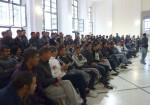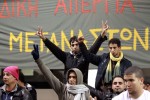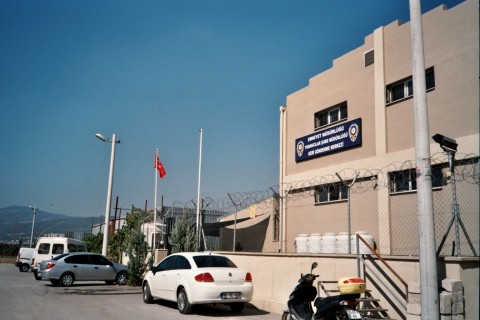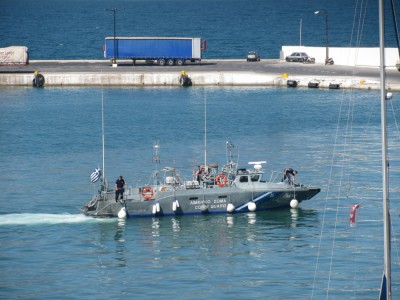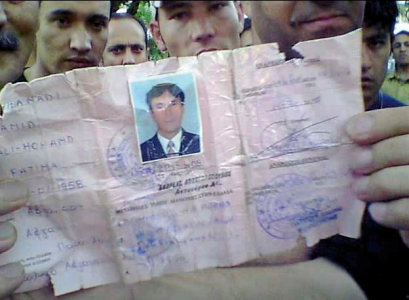Archive for the 'Insight' Category
We are monitoring the situation around the upcoming RABIT deployment to Greece. As it seems, Greece has requested 160 175 officers to be sent to Greece.
- Denmark will contribute five to six officers, which will be able to travel within the next four days.
- Sweden will contribute
a handful
of officers. - France has announced to mobilise the entire French RABIT pool.
- Update 2, 4.11.2010:
- Germany has announced to provide up to 40 officers, plus 7 patrol cars and 4 thermo vision vans (source: Sueddeutsche Zeitung, 4.11.2010)
- The Netherlands will send 14 officers of the Royal Military Police (RMP) and 2 officers of the Rotterdam Seaport Police. These 16 will be in action until December 1 and will then be replaced by other Dutch units.
Update 30.10.2010: Frontex released a third press statement. They will deploy 175 border guards and a additional technical equipment:
In total, 175 border-control specialists have been made available by the 26 Member States and Schengen-Associated Countries participating in the first ever RABIT deployment. Joint Operation (JO) RABIT 2010 will also see an unprecedented quantity of technical equipment and other logistical and administrative support. All the costs incurred by Member States in relation to the deployment will be reimbursed by Frontex.
The specialisations of guest officers deployed will include experts in false documents, clandestine entry, first and second-line border checks and stolen vehicles as well as dog handlers and specialist interviewers, debriefers and interpreters. All RABIT officers receive mandatory human rights awareness training as part of their RABIT training by Frontex and in addition, special briefings will be held on the spot as a provision of JO RABIT 2010.
The deployment is scheduled to commence on 2 November 2010, with an anticipated duration of up to two months.
- 1 Helicopter (Romania)
- 1 Bus (Romania)
- 5 Minibuses (1 Romania, 2 Austria, 1 Bulgaria, 1 Hungary)
- 19 Patrol cars (4WD) (7 Romania, 3 Austria, 2 Slovakia, 7 Germany)
- 9 Thermo Vision Vans (2 Austria, 2 Bulgaria, 4 Germany, 1 Hungary)
- 3 Schengen buses (1 Austria, 2 Hungary)
- 3 office units from Denmark
Developing story, we will update this post.
This update dates back to 14th of October 2010.
It is around 9.30 in the morning, outside the basketball court newcomers are lying on the benches; one more family with three children, two of them small babies. They just arrived this morning, they look for a place to stay… for a room…
We were walking around the whole night, we couldn’t sleep because of the rain… some of the babies with their mothers went to sleep near the church of Ag. Panteleimonas,
says a young Afghan men who was deported from Slovakia. Having no other shelter they risk to be attacked in one of the most “highly protected” areas of Athens. It is the emblem of the victorious “cleaning ups and evacuations” that racist committees of residents together with fascist groups have started against the refugees; a square constantly patrolled by different groups of residents.
Continue reading ‘Update on the Jungle of Athens’
Interview with F. (17) in Zalaergerszeg detention prison
The following interview was taken under difficult circumstances, on the phone of the prison. We had never seen each other before – it was a friend of a friend who brought us in contact. F. was not in a good mood – but he said that he wants to give testimony what happens in Hungary to the deported. He hopes that maybe, if the authorities knew what happens, they might stop the Dublin-system. He says: For me it’s to late now, but maybe all the others, they should not experience the same!
Zalaergerszeg, 13th Oktober 2010 –
There are two conclusions:
- In Hungary the current policy is to detain refugees in general and for longer periods of time. Even if they apply for asylum they will be often detained until the first decision. And also all those, who get deported from other European countries, get imprisoned for often until the limit of six months. Hungary built 11 new detention facilities in the last months.
- In Zalaergerszeg there are obviously at least three minors imprisoned for a longer time, who have been deported to Hungary according to DublinII. We fear that these are not single cases and that in the other detention facilities you might also find minors.
Continue reading ‘Hungary imprisons minors after Dublin II deportation’
It is late in the evening and the small community of homeless Afghans has moved close together to be at least a little bit protected from the rainfalls and the cold of the night. The cardboards used as sofas on the ground are wet. The few umbrellas protect the small children and the women. “It doesn’t matter to me, it matters to the small children. My pullover will become wet, then it will dry. But the babys, the become sick.” A few of the families found some temporary housing solutions, still they come and visit their friends outside in the park. Everybody is just thinking of leaving Greece. But how?
Continue reading ‘Jungle of Athens: A small-talk in the rain under umbrellas and trees’
About the readmission agreement between Turkey and Greece leading to direct refoulement to states that practise torture
The readmission protocol between Greece and Turkey was signed in 2001, but hasn’t entered into force yet. Instead Greece carried out illegal push backs to Turkey via the northern border in the Evros region. In May 2010 Greek and Turkish authorities met and discussed the concrete implementation. They declared their will to implement the readmission protocol in the near future and agreed that at least 1000 requests per year will be accepted by Turkey. More detailed negotiations concerning the protocol are ongoing at the moment. On our journey from Samos via Izmir to Mytilene we found out that parallel to the negotiations first steps are taken to start a one year pilot project, which is expected to start in two to three month from now.
Continue reading ‘From Lesvos to Kabul’
The migrant prison of Pagani near Mitilini, Lesvos stood at the centre of the activities of last year’s noborder. During the noborder, the refugees imprisoned in Pagani started hunger strikes, while noborders stages actions outside, which together led to a significant number of people being set free immediately. September saw numerous revolts inside Pagani, cells were set on fire and the police ultimately withdrew. Pagani was declared as officially closed at the beginning of October.
In the last few days we gradually arrived in Samos and found a totally unexpected situation. The huge detention centre above Vathy is empty, all detainees have been transferred off the island, presumably to Athens, where they are either held in another detention facility or are released with the infamous White Paper.
Currently, there is an Italian Guardia Frontera ship in the harbour representing FRONTEX. The Dutch coast guard is present with a speedboat. From our observations, the latter basically go around and drink coffee at the various beaches. The Greek coast guard has two boats in Vathy, one of them is broken, though. The Italian Frontex ship leaves every night at 10 p.m. and returns in the early morning – but these days they are not very “successful”: According to what they say, they have not caught anybody during the last weeks. Inhabitants told us that still some people arrive on the island but without being caught. But compared to last year, arrivals have dropped dramatically. According to a chatty coast guard officer most refugees now choose the route via the Evros region in the north of Greece. The few people caught on the island are imprisoned in one of three police stations on the island and usually not taken to the detention centre, but sent to Athens straight.
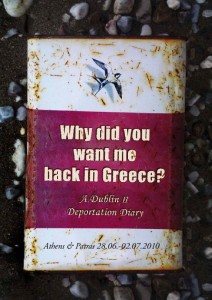
Why did you want me back in Greece?
, ask the refugees being returned due to the Dublin II regulation from different other European countries. The deportation diary carrying the same name evolved out of a short visit in Athens, where activists from the newly founded infomobile project conducted interviews with refugees affected by this European regulation.
The findings, based on interviews with the people affected, are shocking and deeply disturbing. For although every story of flight to and within Europe is different, if we were to summarise, there are two main conclusions that need to be drawn.
new report on detention in Greece by amnesty international +++ European Court of Human Rights +++ Greece calls for a suspension of Dublin II
Amnesty International published an new report about the detention of migrants and refugees in Greece on the 27th of July. The full text can be downloaded here, it contains some 60 pages and contains descriptions of many detention centres in Greece.
The introduction is rather outspoken about the need for a decisive and immediate change in Greek migration policy.

